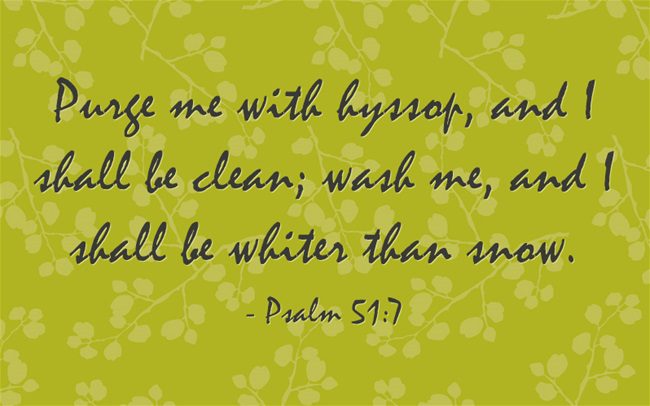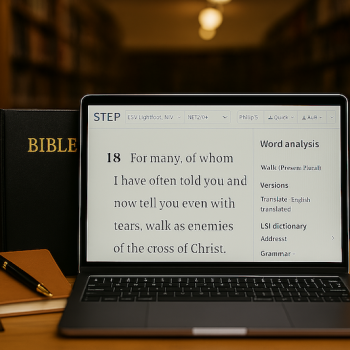Why does the Bible mention “hyssop?” What is a biblical definition of hyssop and why is it important?
Hyssop is…
Hyssop has been around for a very long time. Hyssop apparently is from the mint family. It has a highly aromatic and pungent smell to it. Its leaves have been made into tea, herbal wine, vinegar, oil, and it’s even been used for respiratory disorders but has traditionally, in ancient times, it’s been used as a stimulant. The question is in what context is hyssop used in Scripture? Why does the Bible mention hyssop? Is there also symbolic meaning to it when Jesus was crucified and they offered Him sour wine on a hyssop branch while on the cross (John 19:29)?
Hyssop in the Old Testament
Just before Israel’s Exodus out of Egypt, Moses told all the elders in Israel “Go and select lambs for yourselves according to your clans, and kill the Passover lamb. Take a bunch of hyssop and dip it in the blood that is in the basin, and touch the lintel and the two doorposts with the blood that is in the basin. None of you shall go out of the door of his house until the morning” (Ex 12:21-22). This was so that “the Lord will pass through to strike the Egyptians, and when he sees the blood on the lintel and on the two doorposts, the Lord will pass over the door and will not allow the destroyer to enter your houses to strike you.” (Ex 12:23). This is the first mention of hyssop in the Bible where the blood of the Passover lamb is spread above the door posts and the lintel. This reveals that hyssop had widespread availability in Egypt meaning that it was likely a domesticated crop. I don’t know if there is a lot of significance of the use of the hyssop in relating to the Exodus because the greatest significance of the Exodus was this: “Then Moses said to the people, “Commemorate this day, the day you came out of Egypt, out of the land of slavery, because the LORD brought you out of it with a mighty hand. Eat nothing containing yeast” (Ex 13:3). Even so, hyssop will used in religious practices after the establishment of the Levitical priesthood so its meaning may look backward at some point to Egypt.
The Levites use of Hyssop
The Levitical priests used hyssop extensively in the worship of God. One of the most important functions of the priesthood was that hyssop was used as part of the laws for cleansing lepers where it is written, “the priest shall command them to take for him who is to be cleansed two live clean birds and cedarwood and scarlet yarn and hyssop” (Lev 14:4). Then “He shall take the live bird with the cedarwood and the scarlet yarn and the hyssop, and dip them and the live bird in the blood of the bird that was killed over the fresh water” (Lev 14:6). Leprosy is highly symbolic of sin and so the significance of the death of the birds and their blood looked forward to the cross of Christ where hyssop was involved in the crucifixion but it also backwards to Egypt, where the hyssop was dipped in blood. It is possible that the cedarwood looks back to Egypt as in the door posts and lintel where the blood was applied and then forward for the wooden cross where Jesus’ blood was shed? The “scarlet yarn” could be that scarlet thread of the blood of the Lamb of God that runs throughout the Bible (Gen 3:15-Rev 22:21). It really is a “Him” book.
The Levites use of Hyssop
The Levitical priesthood used hyssop in the purification laws as we read in Numbers 19:6-7 “the priest shall take cedarwood and hyssop and scarlet yarn, and throw them into the fire burning the heifer. Then the priest shall wash his clothes and bathe his body in water, and afterward he may come into the camp. But the priest shall be unclean until evening.” There was also the case where “when someone dies in a tent: everyone who comes into the tent and everyone who is in the tent shall be unclean seven days” (Num 19:14) and then “a clean person shall take hyssop and dip it in the water and sprinkle it on the tent and on all the furnishings and on the persons who were there and on whoever touched the bone, or the slain or the dead or the grave. And the clean person shall sprinkle it on the unclean on the third day and on the seventh day. Thus on the seventh day he shall cleanse him, and he shall wash his clothes and bathe himself in water, and at evening he shall be clean” (Num 19:18-19). During David’s psalm of repentance he referred to hyssop as a cleansing agent, writing “Purge me with hyssop, and I shall be clean; wash me, and I shall be whiter than snow” (Psalm 51:7) and the author of Hebrews writes “For when every commandment of the law had been declared by Moses to all the people, he took the blood of calves and goats, with water and scarlet wool and hyssop, and sprinkled both the book itself and all the people” (Heb 9:19).
Conclusion
When Jesus was about to die on the cross, and “Jesus, knowing that all was now finished, said (to fulfill the Scripture), “I thirst.” A jar full of sour wine stood there, so they put a sponge full of the sour wine on a hyssop branch and held it to his mouth. When Jesus had received the sour wine, he said, “It is finished,” and he bowed his head and gave up his spirit” (John 19:28-30). This is the fulfillment of Psalm 69:21 apparently. Do you thirst for the living water that only Jesus Christ offers? Come to Him and you will never thirst again as “He will guide [you] to springs of living water” (Rev 7:16-17) and that leads to eternal life for all who have repented and trusted in Christ.
Article by Jack Wellman
Jack Wellman is Pastor of the Mulvane Brethren church in Mulvane Kansas. Jack is also the Senior Writer at What Christians Want To Know whose mission is to equip, encourage, and energize Christians and to address questions about the believer’s daily walk with God and the Bible. You can follow Jack on Google Plus or check out his book Blind Chance or Intelligent Design available on Amazon.
















